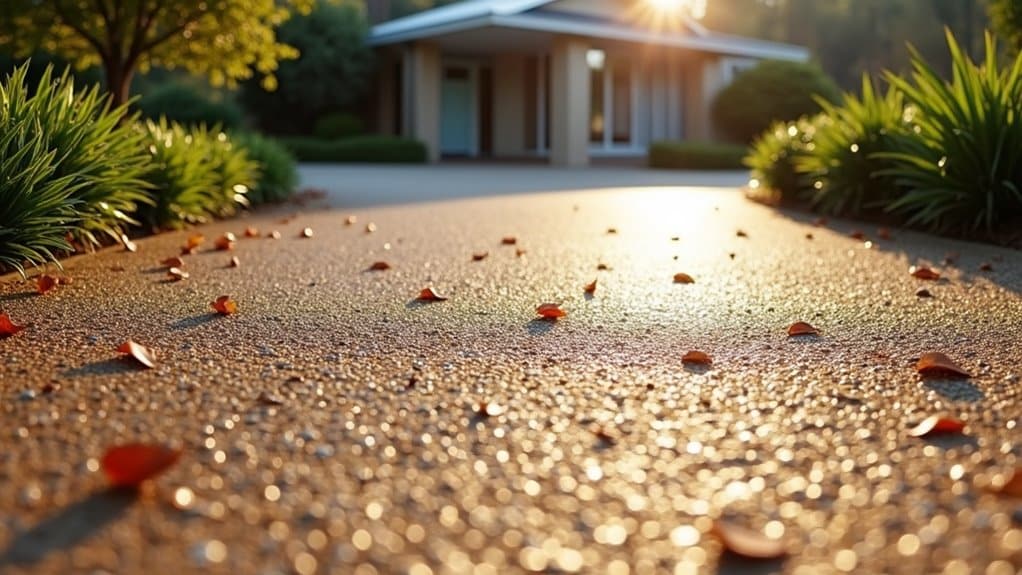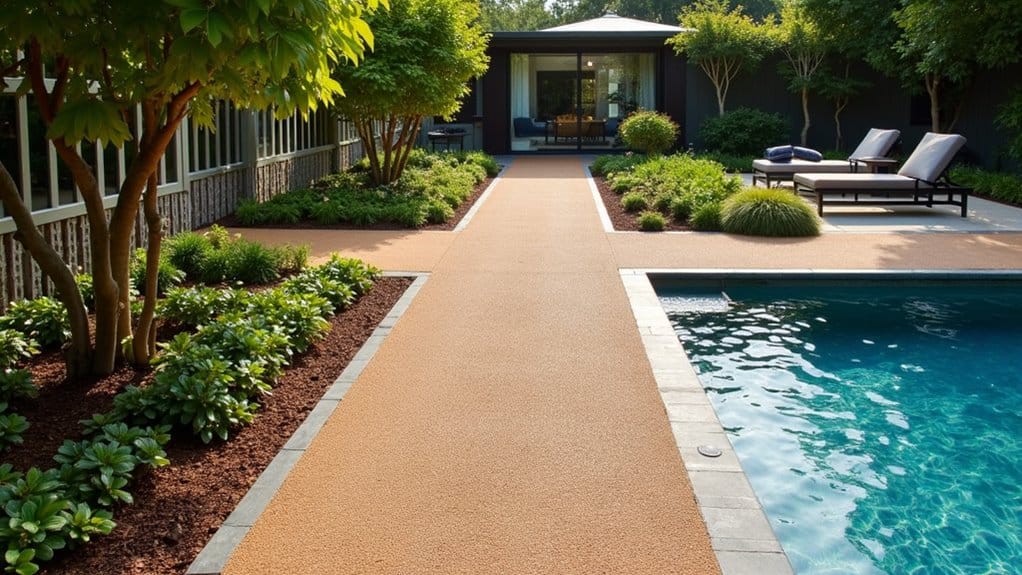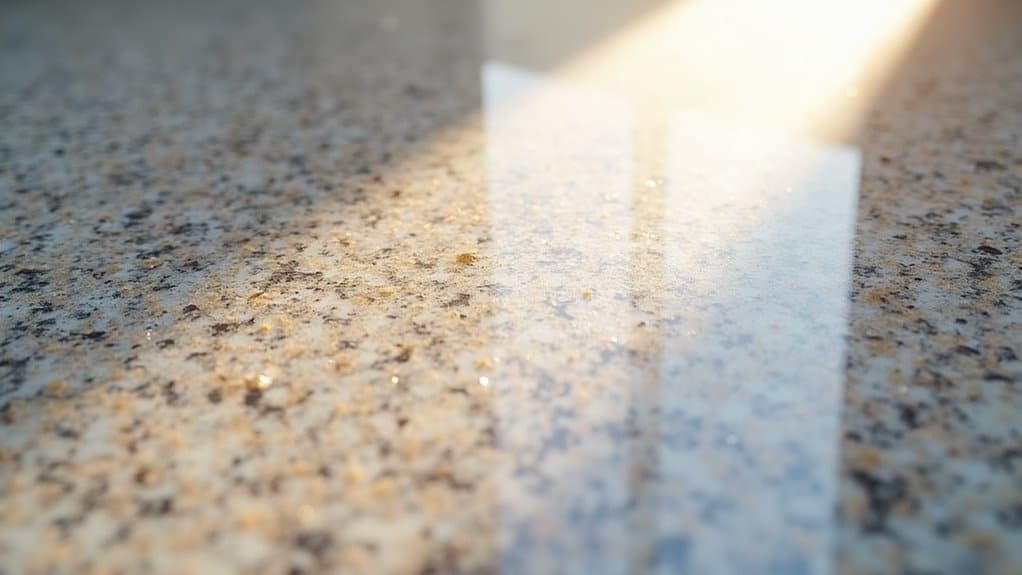A resin bound driveway generally lasts between 15 to 25 years with proper installation and maintenance. Key factors influencing its lifespan include the quality of materials used, how well the sub-base is prepared, and the local environmental conditions. Opting for high-quality aggregates and UV-stable resin can significantly enhance durability, while a strong foundation helps prevent cracking.
To prolong its life, regular maintenance is essential. This includes cleaning the surface and conducting seasonal inspections. It’s also wise to drive carefully and consider the potential impacts of weather. By following these straightforward practices, you can maximise the lifespan of your driveway, ensuring it remains functional and visually appealing for years to come.
Table of Contents
ToggleKey Takeaways
Resin bound driveways can last between 15 to 25 years if they are installed and maintained correctly. Using high-quality materials and skilled installers boosts their durability.
However, factors like weather and UV exposure can affect how long the driveway lasts. Regular maintenance, such as cleaning and inspections, helps spot any problems early and can extend its lifespan. With good care, some resin bound driveways may even last over 25 years.
Factors Affecting Lifespan
The lifespan of a resin bound driveway depends on several key factors that influence its performance and durability.
Firstly, the quality of installation is crucial; using top-notch materials and skilled tradespeople ensures stability. Proper preparation of the sub-base is also essential, as a solid foundation supports the driveway’s longevity. Additionally, the resin layer needs to be thick enough to handle regular vehicle traffic.
It’s vital to incorporate effective drainage systems during installation. Without proper drainage, water can pool and damage the resin over time, leading to early deterioration.
Weather conditions also play a role; extreme temperatures and persistent moisture can weaken the resin. The durability of resin driveways is also enhanced by proper drainage and ventilation during installation to mitigate potential issues.
Your driving habits can impact the driveway too. Frequent heavy traffic and sharp turns can cause wear and tear. To minimise damage, avoid placing heavy machinery on the surface and carry out regular inspections to identify potential issues early on.
Lastly, consistent maintenance—like regular cleaning and sealing—helps protect the driveway from UV rays and environmental wear, ultimately extending its lifespan.
Expected Lifespan Overview
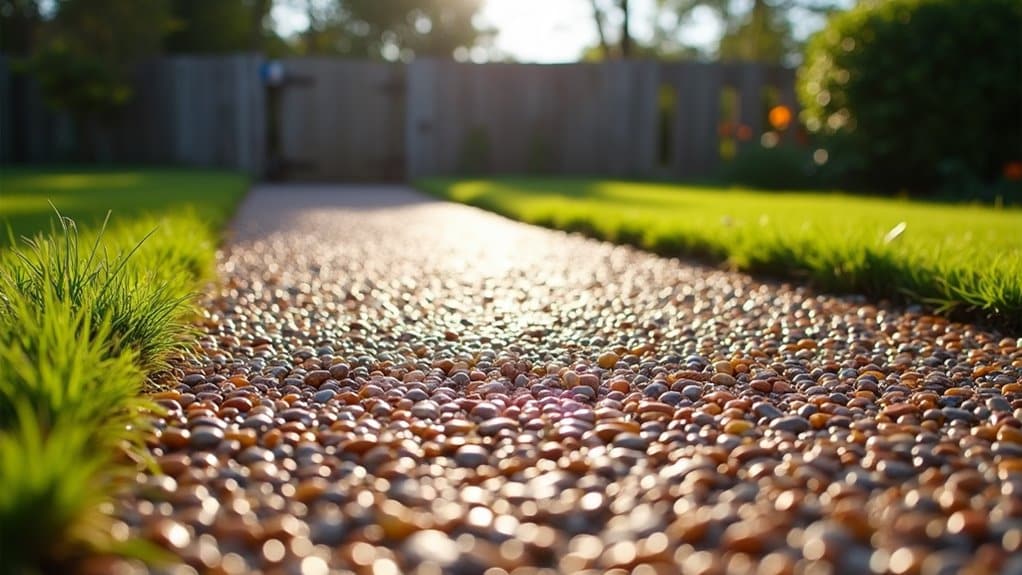
Considering the various factors that affect the durability of a resin bound driveway, you can expect it to last between 15 to 25 years. With proper installation and maintenance, this lifespan can extend beyond 25 years. Resin bound driveways typically outlast traditional asphalt and concrete options.
Here are four key points to consider regarding lifespan:
- Installation Quality: Proper installation is crucial. Subpar techniques can lead to quicker wear.
- Environmental Impact: Resin bound driveways are SUDS compliant, promoting effective water drainage and minimising environmental strain.
- Weather Resistance: They’re UV resistant, which helps reduce fading and discolouration from sun exposure. Additionally, resin-bound surfaces are considered more resilient than concrete, self-binding gravel, or traditional asphalt.
- Usage Patterns: While these driveways can handle heavy traffic, consistently heavy loads may speed up wear, so monitoring usage is important.
Investing in a resin bound driveway not only improves your property’s appearance but also offers a durable, cost-effective solution for your driveway needs.
Following manufacturer guidelines will help protect your investment and maximise your driveway’s lifespan.
Maintenance Requirements Explained
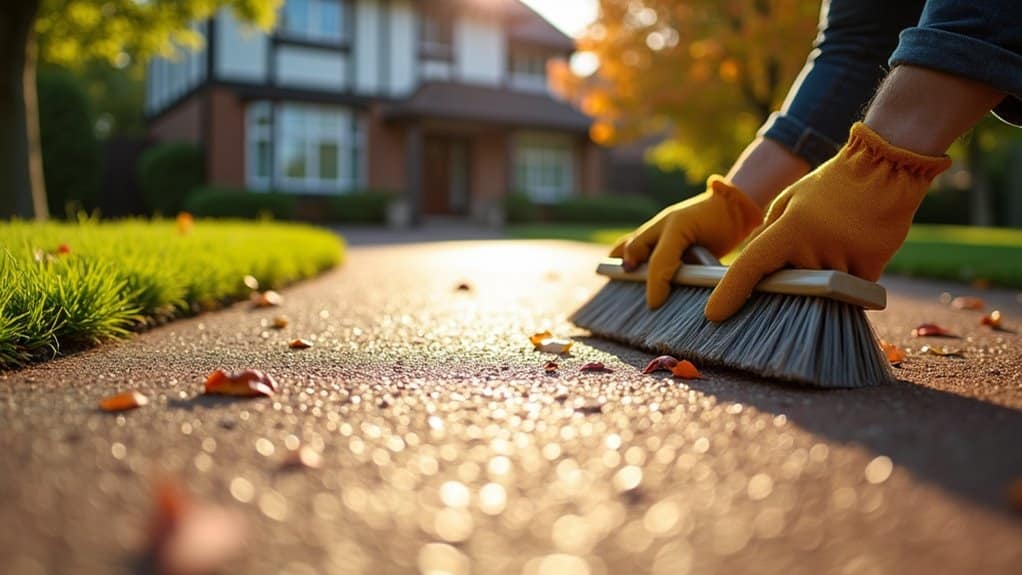
To keep your resin bound driveway in good shape, regular cleaning is key. Sweep or blow away any debris daily, and for a deeper clean, use a mild detergent. Avoid harsh chemicals, as they can damage the surface. Being cautious with chemical exposure will help prevent wear and tear and keep your driveway looking its best. Additionally, regular cleaning can significantly enhance the longevity of your driveway’s appearance. Remember to apply a protective sealant after cleaning to minimize stain absorption and maintain its pristine condition.
Regular Cleaning Practices
Maintaining your resin bound driveway is crucial for its durability and visual appeal. Regular cleaning, such as effective sweeping and pressure washing, will ensure your driveway remains in excellent condition.
Here are four essential maintenance steps to follow:
- Daily Sweeping: Use a stiff broom to sweep the driveway regularly, removing leaves, twigs, and other debris. Increase this routine in autumn to tackle fallen leaves effectively.
- Pressure Washing: Every few years, employ a pressure washer on a low to medium setting (around 150 bar) for a thorough clean. Always test it on a small, hidden spot first to avoid any damage. This gentle cleaning method helps to maintain the driveway’s aesthetic appeal over time.
- Debris Removal: Promptly clear away rubbish and weed seeds to prevent moss growth and keep your driveway looking tidy.
- Stain Management: React quickly to spills by blotting with absorbent materials and cleaning with a mild detergent solution. This will help prevent stains and maintain the surface’s integrity.
Chemical Avoidance Tips
Chemicals can significantly damage your resin bound driveway, so it’s crucial to be aware of harmful substances for effective upkeep. Prioritising chemical safety helps ensure your driveway is both durable and visually appealing. Here are key chemicals to avoid, along with recommended cleaning practices:
| Harmful Chemicals | Recommended Cleaning Practices |
|---|---|
| Harsh chemicals | Use mild detergents specifically for resin |
| Acidic substances | Steer clear of bleach and acidic cleaners |
| Oil-based products | Clean spills immediately to avoid staining |
Always test any cleaning products on a small area first, as some may not be suitable. Avoid high-pressure washing, as this can loosen the aggregate. When cleaning, wear protective gear to prevent spills. Exposure to harmful chemicals can lead to discolouration, cracks, and a reduced lifespan for your driveway. By following these guidelines, you can maintain the integrity of your resin bound driveway and extend its lifespan. Regular inspections will help you spot any potential damage early, keeping your driveway in top condition. Additionally, proper maintenance(https://www.fabulousresindriveways.co.uk/advantages-of-resin-driveway-aftercare.html) practices can help ensure that your driveway lasts over 20 years, as durable material contributes to its longevity.
Importance of Quality Installation
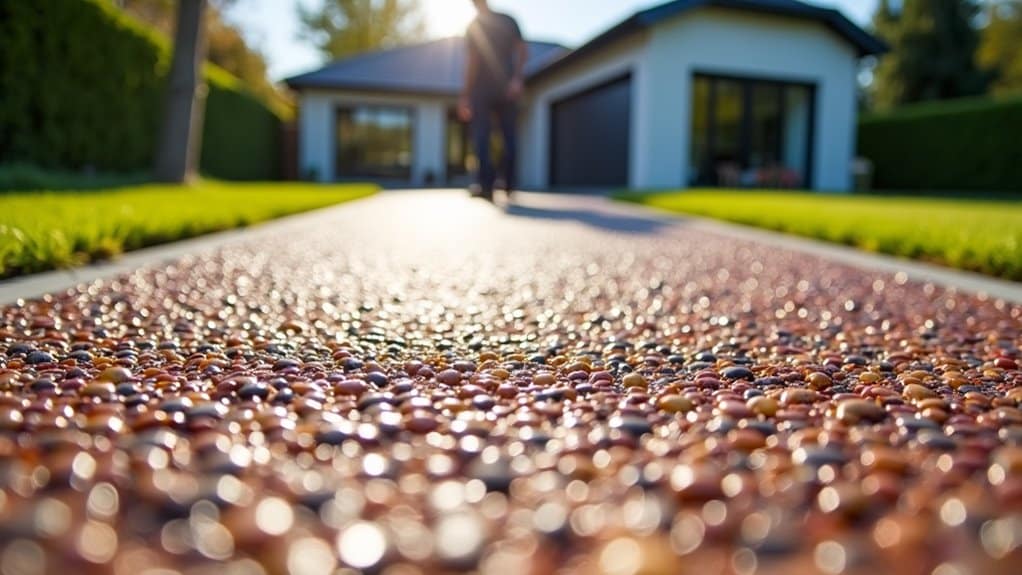
A quality installation is crucial for ensuring the longevity of your resin bound driveway. When you invest in this type of driveway, the techniques used during installation and the expertise of the installer greatly influence its lifespan.
Here are four key factors to consider:
- Proper Base Preparation: A strong base, such as tarmac or concrete, is vital for supporting the driveway’s weight and preventing cracks.
- Correct Mixing Ratios: Using the right proportions of aggregates and resin is essential for achieving maximum durability.
- Professional Laying: Skilled installers understand how to create a smooth finish and maintain the correct thickness of 12-24mm for optimal resilience.
- Quality Control: Adhering to high installation standards helps avoid wear and tear, ensuring your driveway stays in great shape. Additionally, having a strong foundation of theoretical knowledge can significantly enhance the quality of the installation process.
Choosing qualified installers with a solid track record minimises the risk of common errors. Their expertise ensures that your driveway isn’t only attractive but also strong and long-lasting.
Prioritising quality installation can save you from expensive repairs in the future.
Materials Impacting Durability
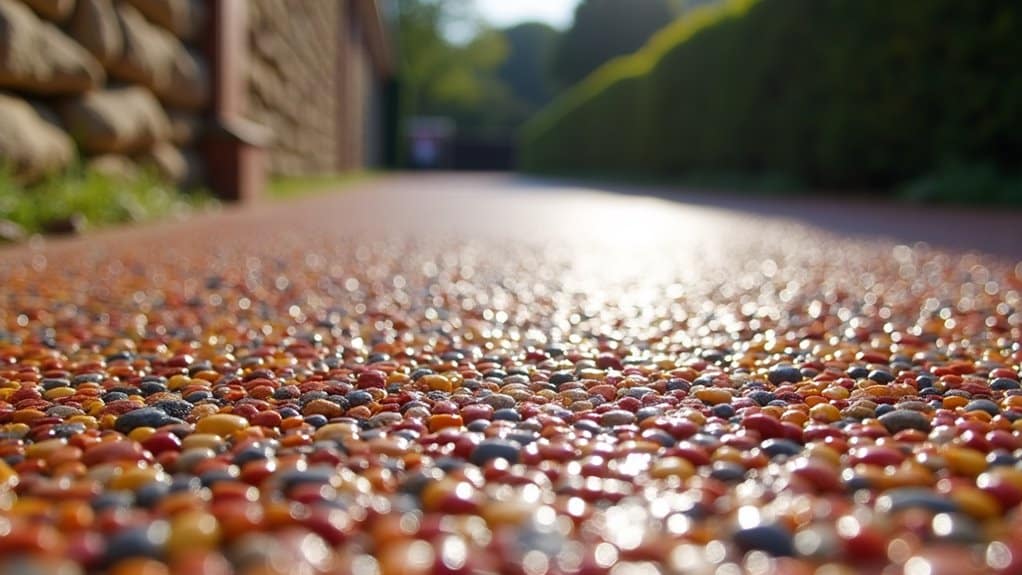
The longevity of your resin bound driveway largely hinges on the materials used during its installation.
First and foremost, the choice of aggregate is crucial; opting for high-quality aggregates not only boosts durability but also ensures a smooth surface that resists cracking and shifting. The type of aggregate affects both the appearance and lifespan of your driveway.
Equally important is the resin formulation. Choosing UV-stable resin helps maintain colour and protects against wear over time. Proper mixing of resin and aggregates is essential to achieve optimal performance.
The stability of the sub-base also plays a significant role. A solid, level sub-base—whether asphalt or concrete—is vital for durability. An inadequate sub-base can lead to premature wear and tear. Additionally, a well-installed resin driveway can have a lifespan of a decade or more, making it a cost-effective option for homeowners.
Furthermore, the techniques used during installation are key. Using a clear binding resin and ensuring proper trowelling can improve permeability and meet Sustainable Urban Drainage Systems (SUDS) compliance.
Don’t forget about maintenance materials either. Regular upkeep with the right products is important for preserving the integrity of your driveway.
Weather Conditions Considerations

Weather conditions play a significant role in the durability and performance of your resin bound driveway. By understanding how different weather factors affect your driveway, you can make better maintenance decisions. Here are some key points to consider:
- Temperature Extremes: Both severe cold and heat can cause damage. Cold weather may lead to cracks, while high temperatures can soften the resin, resulting in surface impressions, particularly under heavy traffic.
- Seasonal Challenges: Each season has its own hurdles. Heavy rainfall and freeze-thaw cycles can compromise the structure of your driveway, so consider installing proper drainage solutions to prevent water accumulation.
- UV Exposure: Continuous exposure to UV rays can degrade the resin, leading to discolouration and brittleness. Using UV-resistant coatings can help protect your driveway from these effects.
- Humidity Levels: High humidity can weaken the resin bond, affecting the overall integrity of the driveway. Regular inspections can help you identify and address potential problems before they escalate.
Usage and Its Effects
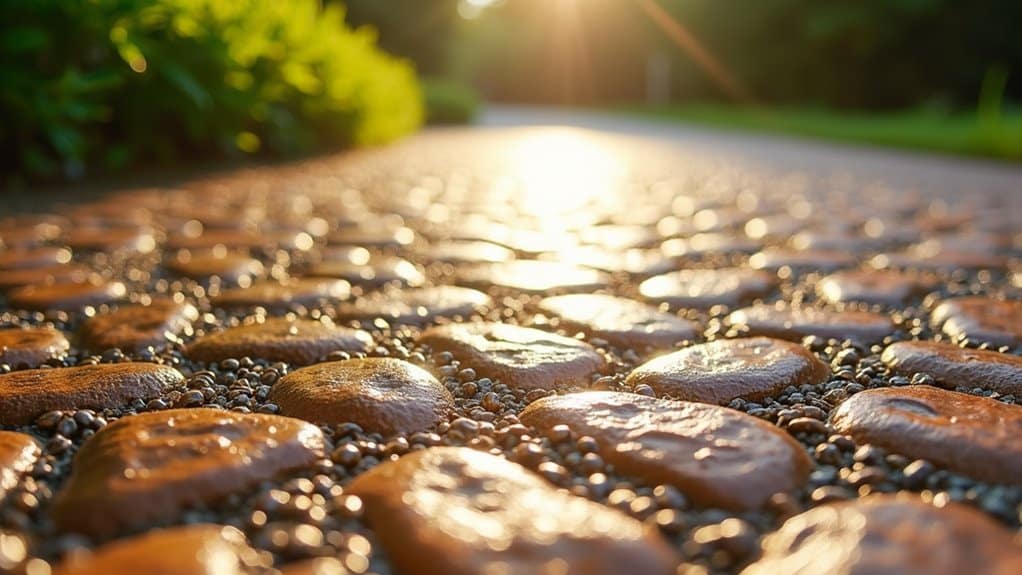
Using your resin bound driveway for heavy traffic can significantly shorten its lifespan, often reducing it to just 10 years.
In contrast, regular residential use can extend its longevity to around 15 years, provided you maintain it properly.
Understanding how usage affects durability is key to getting the most out of your driveway.
For example, if you regularly park heavy vehicles on it, consider alternative parking solutions to help prolong its life.
Heavy Traffic Impact
In high-traffic situations, resin bound driveways encounter significant challenges that can affect their durability. Subjecting your driveway to heavy vehicle use can greatly reduce its lifespan.
Resin driveways are ideally suited for moderate to low traffic levels, as frequent use leads to increased wear and tear. To improve durability, consider these key factors:
- Installation Depth: Ensure a depth of 15-18mm in areas with heavy traffic, especially where vehicles frequently turn.
- Traffic Volume Awareness: Design your driveway to accommodate expected traffic, using suitable materials recommended during a site assessment.
- Regular Maintenance: Carry out inspections and maintenance to catch wear early and prevent further damage.
- Damage Prevention: Steer clear of rigid objects and high-pressure activities, and keep the surface free from vehicle fluid spills.
Proper installation and a well-prepared sub-base are crucial for bearing heavy loads. Consulting professionals can help you choose the right materials to prolong the life of your resin bound driveway in high-traffic conditions.
Residential Use Longevity
A properly installed resin bound driveway can last between 15 to 25 years with standard residential use. The key to achieving this longevity is the quality of the installation.
Using the right techniques ensures a solid sub-base, which is crucial for durability. Poor installation can lead to early wear and tear, significantly shortening the driveway’s lifespan.
Environmental factors also play a role in how long your driveway stays in good condition. For instance, extreme weather, particularly UV exposure, can cause fading and brittleness over time.
To optimise your driveway’s lifespan, it’s best to install it in a dry setting, as high humidity can lead to bonding issues that affect its strength.
In terms of aesthetics, moderate traffic is ideal for resin bound driveways. They can comfortably handle regular residential vehicles, but heavy vehicles may reduce the lifespan to around 10 years.
Avoiding dry steering and heavy loads can help you maintain your driveway for longer. Ultimately, a well-maintained resin driveway won’t only enhance your property’s appearance but also endure the test of time.
Maintenance and Usage Relation
Proper maintenance is essential for the longevity of your resin bound driveway. By following a few straightforward practices, you can enhance its durability while benefiting from its drainage capabilities and eco-friendly features. Here are some essential maintenance tips:
- Regular Sweeping: Sweep regularly to remove debris and prevent dirt buildup, which can encourage algae growth.
- Pressure Washing: Gently pressure wash the surface occasionally to keep it clean and looking its best.
- Spill Management: Clean up spills promptly with mild household cleaners to avoid staining.
- Vary Parking Locations: Change where you park now and then to minimise wear on specific areas.
When using your driveway, be cautious with vehicle weight. Regular cars are fine, but heavy vehicles can damage the surface and shorten its lifespan.
If you anticipate heavy traffic, it’s wise to consult a professional. Remember, the permeable nature of your driveway helps recharge groundwater and supports sustainable drainage practices.
Installation Best Practices
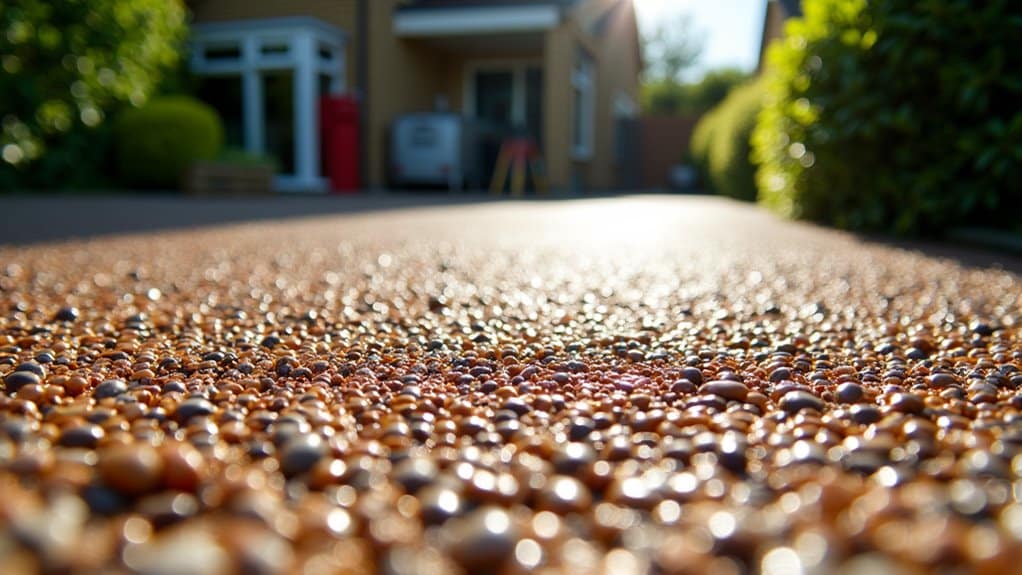
Achieving a durable and attractive resin bound driveway relies on careful installation practices. Start with pre-installation checks to ensure the surface is suitable, stable, and undamaged. Be mindful of environmental factors, such as substrate temperature and humidity, to avoid problems later.
Proper priming is crucial; applying a primer ensures strong adhesion between the resin and the base. When mixing resin and aggregate, use the correct ratios and a powerful drill to achieve a consistent blend.
Here’s a quick overview of essential installation techniques:
| Step | Description | Importance |
|---|---|---|
| Surface Preparation | Clean and inspect for damage prior to installation. | Provides a solid foundation. |
| Priming | Apply primer for better adhesion. | Prevents peeling. |
| Mixing | Thoroughly combine resin and aggregate. | Ensures consistency and strength. |
| Spreading | Evenly distribute the mixture across the surface. | Ensures a level finish. |
| Curing | Leave for 24-48 hours to cure. | Ensures durability and longevity. |
Environmental Factors to Consider

When choosing a resin bound driveway, it’s important to consider several environmental factors that can impact its longevity.
Firstly, UV resistance is crucial; it helps keep the colour vibrant and the surface intact.
Secondly, permeability is essential for effective water drainage, which helps prevent pooling and flooding.
Lastly, it’s vital to understand how different weather conditions—like heavy rain or frost—can affect the material’s performance.
UV Resistance Benefits
A high-quality UV stable resin significantly improves the longevity and durability of resin bound driveways by providing excellent protection against damaging ultraviolet (UV) rays.
This UV stability is crucial for preserving both the strength and visual appeal of your driveway.
Here are some key benefits of UV stability:
- Colour Retention: UV stable resin helps prevent fading and yellowing, ensuring your driveway stays vibrant for years.
- Longevity and Durability: These resins offer enhanced resistance to UV degradation, potentially extending your driveway’s lifespan by up to 25 years with minimal upkeep.
- Environmental Considerations: UV stable resins break down more slowly, reducing the risk of harmful substances being released and lessening environmental impact.
- Maintenance and Aesthetic Appeal: With greater resistance to wear and discolouration, these resins require less maintenance, improving the overall appearance of your property.
Permeability Advantages
The permeability of resin bound driveways offers significant environmental benefits that enhance both their functionality and sustainability.
These driveways allow water to infiltrate at rates of up to 850 litres per m² per minute, which helps reduce surface water runoff. This, in turn, eases the burden on local drainage systems and lowers the risk of flooding.
The gaps between the aggregates in the resin-bound surface enable water to flow through, promoting groundwater recharge. As rainwater seeps through, it prevents puddles from forming, creating a safer surface and reducing soil erosion.
This eco-friendly approach supports the natural water cycle and improves rainwater management.
Resin bound driveways also comply with Sustainable Urban Drainage Systems (SUDS) protocols, requiring less maintenance than traditional surfaces as they don’t need extra drainage channels.
With a lifespan of up to 25 years when installed and maintained properly, these driveways provide durability and serve as a long-term solution for managing excess rainwater.
Their permeability not only enhances functionality but also significantly contributes to environmental sustainability.
Weather Impact Analysis
Understanding how weather affects resin bound driveways is vital for their durability and performance. Here are four important factors to consider:
1. Temperature Changes: Severe cold can lead to freeze-thaw cycles, which may cause cracking and weaken the surface.
This type of damage can shorten the driveway’s lifespan by as much as five years.
2. Installation Weather: Installing the driveway in high humidity or wet conditions can hinder the resin’s curing process, resulting in poor bonding.
For the best results, aim for moderate temperatures during installation.
3. Heavy Rain: Excessive rainfall can wash away the surface and weaken the resin bond over time, leading to deterioration.
4. Sun Exposure: Extended exposure to sunlight can lead to discolouration and brittleness, compromising both the appearance and structural integrity of the driveway.
Cost-Effectiveness Analysis
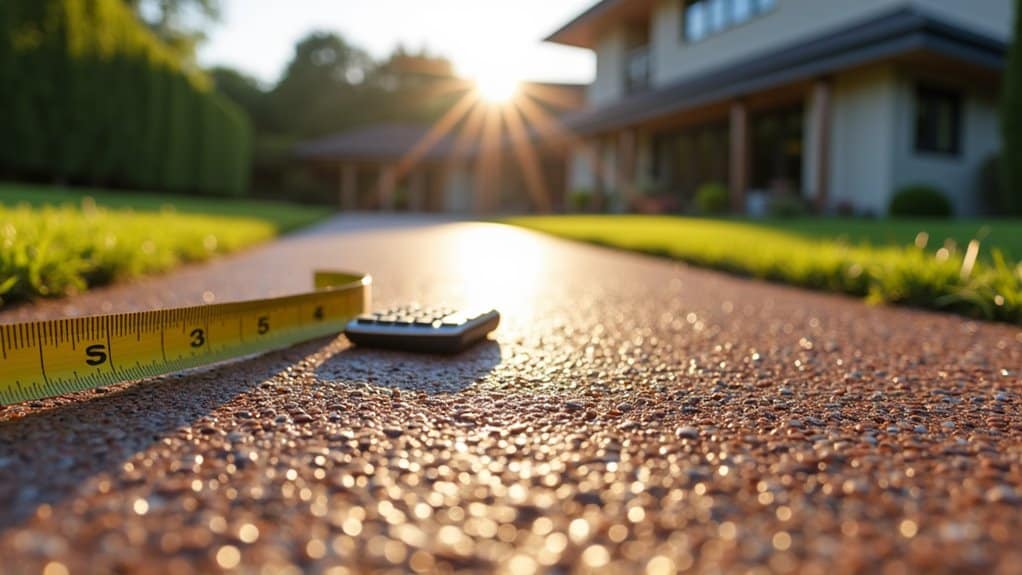
Investing in a resin bound driveway can be a wise financial choice due to its long-lasting benefits. The initial cost typically falls between £90 and £160 per square metre, but its durability and low maintenance requirements can significantly boost your return on investment.
| Cost Component | Estimated Cost (£/m²) |
|---|---|
| Materials | 40 – 70 |
| Labour | 30 – 50 |
| Preparation | 20 – 40 |
| Total Initial Investment | 90 – 160 |
| Longevity | 15-25 years |
To maintain your driveway, simple tasks like regular sweeping and avoiding harsh chemicals are all that’s needed, which can further extend its lifespan. With minimal upkeep and resilience against the UK weather, the long-term value is impressive. You’ll not only avoid frequent replacement costs but could also see an increase in your property’s value due to its attractive appearance. Thus, the initial investment is outweighed by significant long-term benefits, making it a cost-effective option overall.
Comparing Resin With Other Driveways
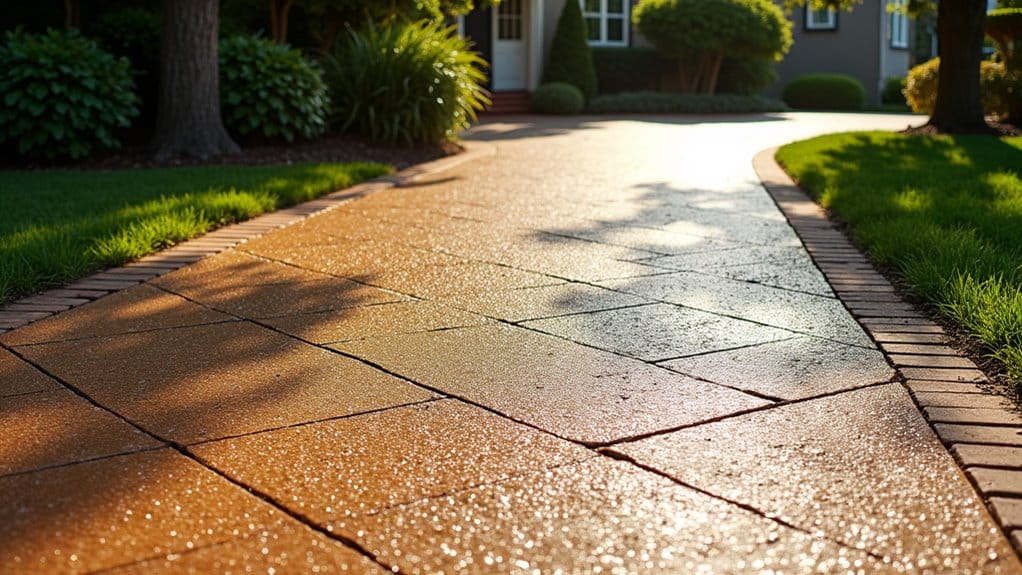
When considering a resin bound driveway, it’s essential to compare it with other popular driveway materials to understand its advantages fully. The benefits of resin include durability, low maintenance, and appealing aesthetics.
Here’s how resin compares to other options:
- Tarmac: Typically lasts 10-15 years and often needs resurfacing, making it less durable than resin.
- Block Paving: Can shift, crack, and allow weeds to grow, requiring regular cleaning and maintenance.
- Concrete: While strong and able to handle heavy loads, it can crack due to freeze-thaw cycles and needs regular sealing.
- Asphalt: Similar lifespan (15-25 years), but more susceptible to damage from extreme weather.
Resin bound driveways can last up to 25 years with proper installation and care, offering excellent long-term value.
Their UV resistance prevents fading, keeping your driveway looking good.
With minimal upkeep, resin bound driveways clearly outperform other materials in both longevity and appearance.
Maximizing Driveway Longevity
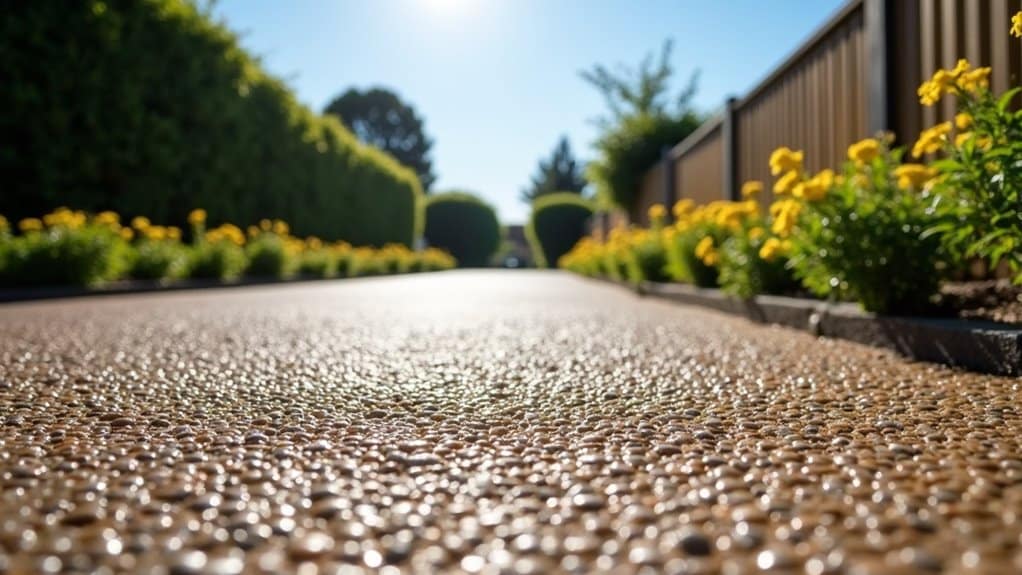
To ensure your resin bound driveway lasts as long as possible, there are a few key factors to consider from the start. First, opt for high-quality materials, including top-notch resin and aggregates. This choice not only improves the look of your driveway but also significantly enhances its durability.
Proper installation is crucial; ensure the sub-base is well-prepared and stable to avoid future problems. Pay attention to the weather during installation. Resin cures best in dry, moderate temperatures, so plan your project for suitable conditions.
Regular maintenance is vital for longevity. Sweep the surface regularly to remove debris, and clean spills promptly to prevent stains. Avoid exposing the resin to harsh chemicals, and power wash the driveway periodically to keep it looking its best.
Limit heavy traffic and steer clear of sharp turns that could strain the surface. Keep in mind that some resin colours may show wear differently, so choose wisely based on your usage and aesthetic preferences.
Common Issues and Solutions
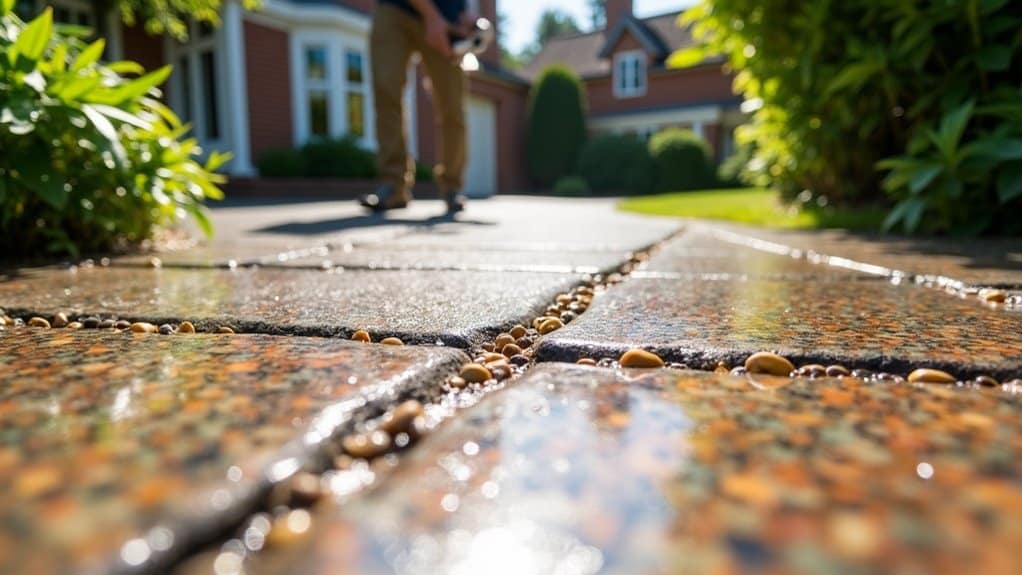
Resin bound driveways are known for their durability and visual appeal, but they can face some common issues that may impact their lifespan and performance.
Here’s a straightforward guide to help you tackle these problems and keep your driveway looking its best.
1. Loose Stones: This happens when the aggregates don’t bond properly with the resin.
To prevent unsightly patches, carry out regular maintenance and address any loose stones promptly by chiselling out and replacing the affected areas.
2. Poor Drainage: Often a result of faulty installation, inadequate drainage can lead to water pooling.
Ensure your driveway has the correct slope for drainage and clean it routinely to prevent blockages.
3. Stains and Spills: Oil or chemical spills can detract from the driveway’s appearance.
If a spill occurs, act quickly by blotting up excess liquid and cleaning the area with a mild detergent to minimise any potential damage.
4. Weed Growth: Weeds can undermine both the look and structure of your driveway.
Regularly inspect for weeds and remove them, especially during seasonal maintenance, to keep your driveway in top condition.
Frequently Asked Questions
Can I Install a Resin Bound Driveway Myself?
Yes, you can install a resin bound driveway yourself, but ensure you have the correct tools and follow DIY guidelines carefully. Good preparation and timely application are essential for achieving a lasting finish. For example, make sure the base is well compacted and free of debris before starting. With patience and attention to detail, you can create a professional-looking driveway.
What Colors Are Available for Resin Bound Driveways?
Resin bound driveways come in a range of colours to suit your style. You can choose from natural shades such as beige and grey, or opt for bolder colours like red and blue. There are also custom mixes available to match your preferences.
How Do I Know if My Driveway Needs Repairs?
If your driveway has cracks resembling the Grand Canyon, it’s time to take notice! Watch for signs such as standing water, uneven surfaces, and crumbling edges. Regular maintenance can help you avoid expensive repairs in the future.
Is Resin Bound Driveway Suitable for Cold Climates?
Yes, a resin bound driveway is well-suited for cold climates. It’s designed to handle freezing and thawing without cracking. Its permeable surface allows water to drain away, which helps to reduce ice formation, making it safer during winter. For example, unlike traditional tarmac, it won’t develop unsightly potholes or cracks, ensuring a reliable and durable surface all year round.
Can I Park Heavy Vehicles on a Resin Driveway?
Parking heavy vehicles on a resin driveway can lead to problems. For example, if a delivery lorry is regularly parked there, the weight could cause cracks and shorten the driveway’s lifespan. It’s advisable to speak with a professional to discuss the implications of heavy vehicle parking on your resin surface.
Conclusion
In summary, a well-installed resin bound driveway can last up to 20 years, making it a robust option for your property. Research indicates that with proper maintenance, resin driveways can reduce cracking by up to 50% compared to traditional asphalt. By understanding the factors that influence their lifespan and committing to regular upkeep, you can ensure your driveway remains functional and visually appealing for many years.
Prepare the perfect base for your resin bound stone installation and discover the crucial factors that ensure lasting durability.
Know where resin bound surfacing can transform spaces for both residential and commercial use, and discover the countless benefits that Read more
A stone carpet combines beauty and resilience in flooring, but what makes quartz floors uniquely beneficial? Discover the secrets behind Read more

